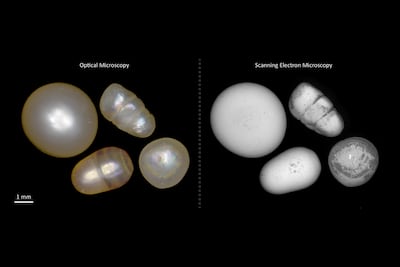Bahrain is on a mission to revitalise its pearl sector, with the help of engineers at the Massachusetts Institute of Technology.
The leading US university is involved in a three-year collaboration with the Bahrain Institute for Pearls and Gemstones (Danat) — a gemological laboratory that specialises in the testing and study of natural pearls.
This project will seek to establish a natural pearl’s area of origin and method of growth to uniquely identify it and ensure traceability “from sea to consumer”, said Noora Jamsheer, chief executive at Danat.
It will help distinguish highly prized natural pearls from human-produced cultured pearls.
This is part of the Bahraini government's commitment to natural pearls, a luxury commodity that was the main source of income for the Gulf region — including the UAE — for thousands of years.
Danat is committed to Bahrain’s desire to protect and advance Bahrain’s pearling heritage and history.
In 2017, Bahrain launched a national plan to revive the pearl sector, aiming to improve and strengthen Bahrain’s status as a global centre for natural pearls.
Danat's collaboration with MIT will be led by the university's Admir Masic, associate professor of civil and environmental engineering, with Vladimir Bulovic, the Fariborz Maseeh chairman in emerging technology and professor of electrical engineering and computer science.
The project will use machine learning to automate pearl classification, allowing researchers to investigate techniques to create a unique identifier associated with an individual pearl.
“Working with Danat provides us a unique opportunity to apply our lab’s multi-scale materials characterisation tools to identify potentially species-specific pearl fingerprints,” said Mr Masic.
“Pearls are extremely complex and fascinating hierarchically ordered biological materials that are formed by a wide range of different species.”
Like many precious gems, as well as occurring naturally, pearls can also be made by humans.
“Today, there are lab-grown diamonds, lab-grown emeralds and rubies which also have a market. The challenge that exists is when lab-grown gemstones are not disclosed to consumers and are sold at unfair prices,” said Ms Jamsheer.

“The MIT and Danat collaboration aims to protect consumer's trust and confidence in natural pearls and the jewellery industry.”
In practice, the project will play a pivotal role in transforming the luxury market when it comes to using pearls, said officials.
Traceability and sustainability of pearl-farming activities will be made easier at a time when regulators are increasing pressure on the fashion and luxury industries to reveal supply chains and social impact.
“By finding unique identifiers for natural pearls, the fashion industry will be able to trace natural pearls,” said Ms Jamsheer.
“Once the identifiers are linked to blockchain, we can ensure traceability throughout the natural pearl value chain — from sea to consumer.”



